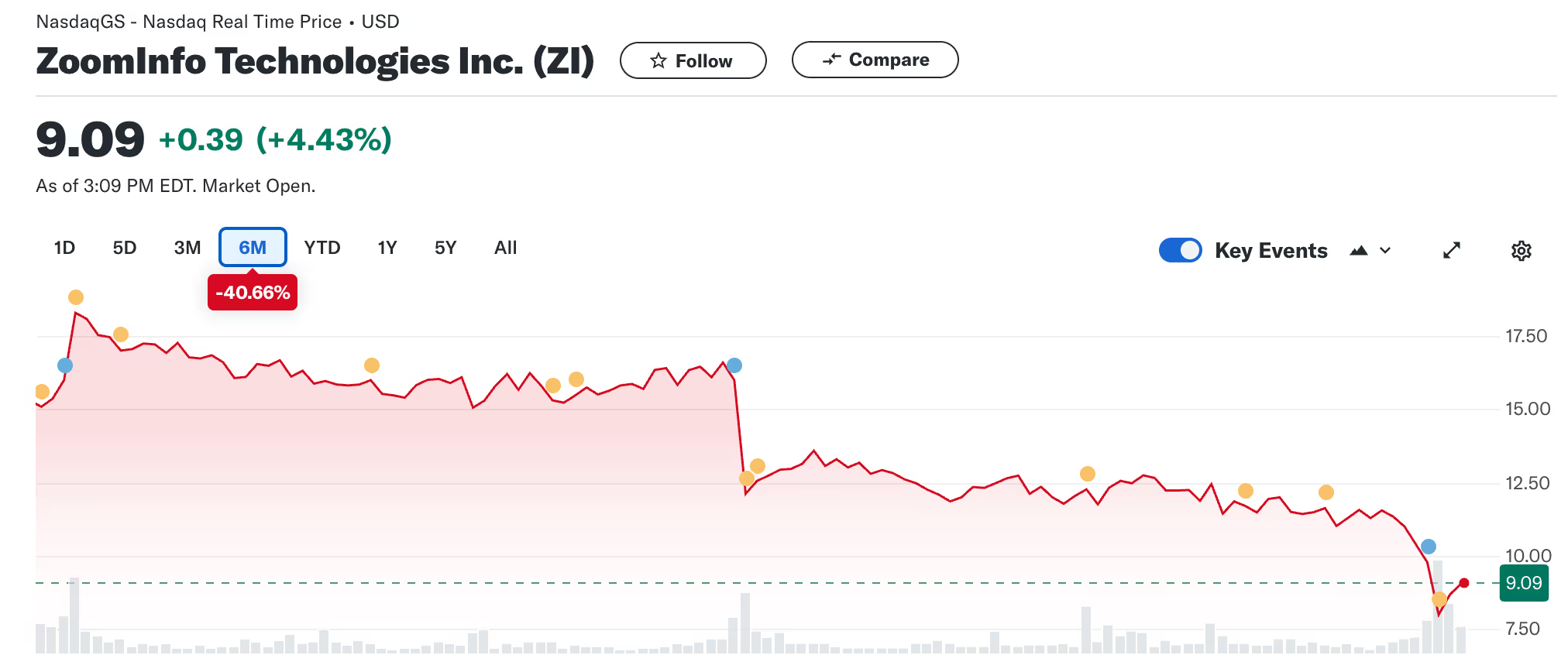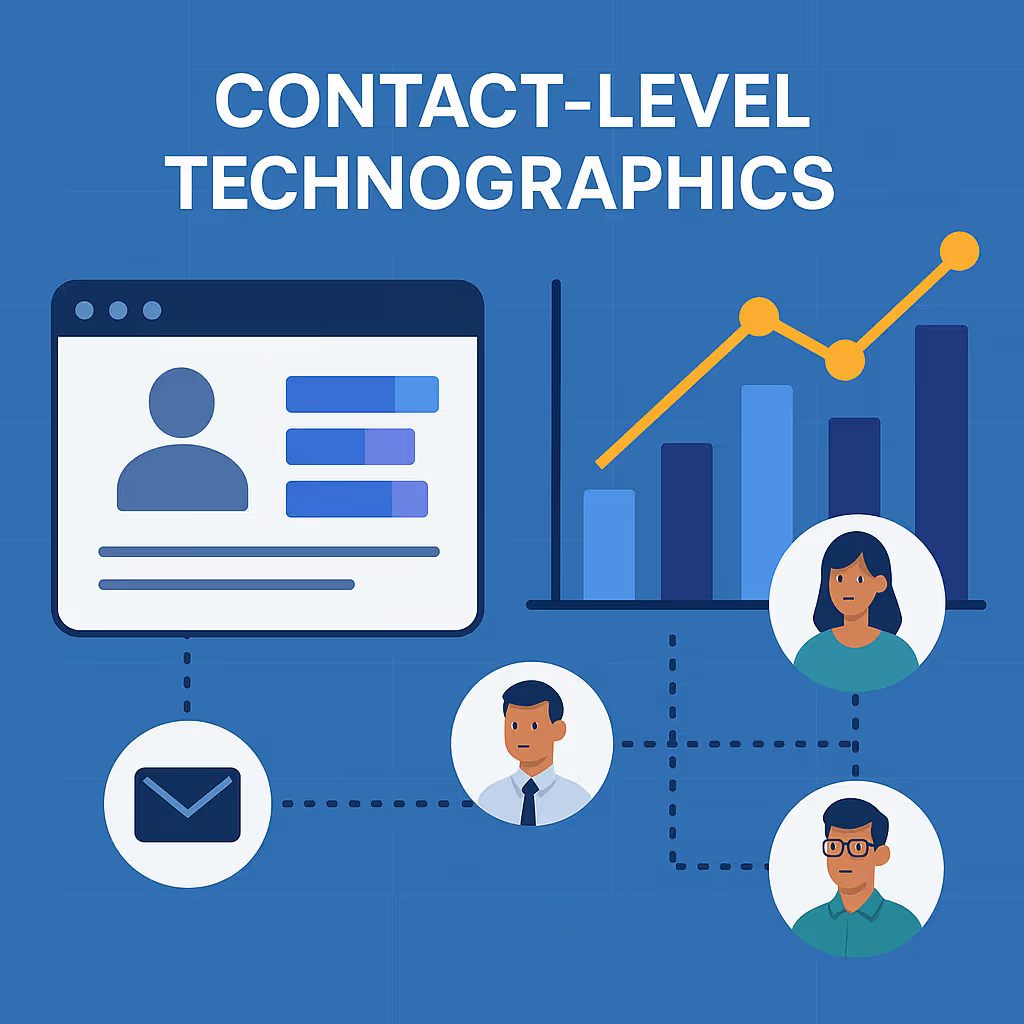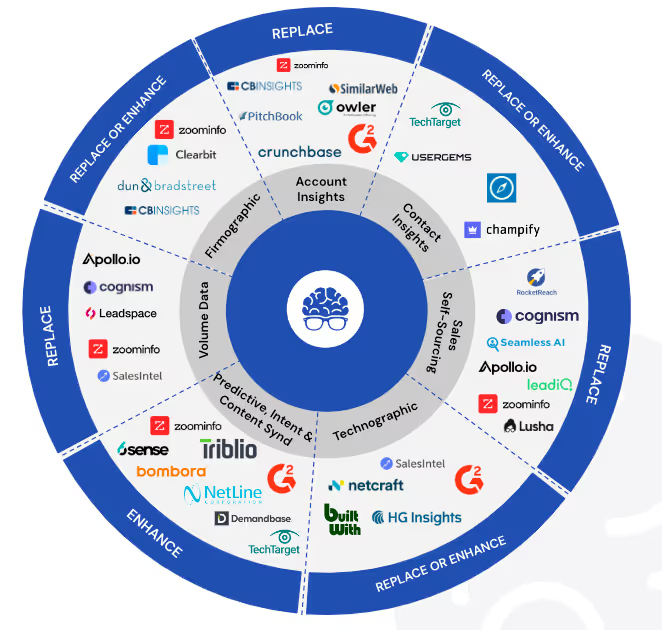The business landscape is undergoing a seismic shift, much like the one witnessed in the early 2000s when Blockbuster Video saw its customer base erode in favor of streaming giants like Netflix and YouTube. Today, we're observing a similar transformation in the data industry, where traditional data providers like Zoominfo and Apollo.io are losing ground to more dynamic and flexible solutions such as LeadGenius and Clay. This blog post explores this paradigm shift and its implications for the future of data operations.
The Downfall of ZoomInfo and Prebuilt Databases
Recently, Zoominfo missed its quarterly earnings, signaling trouble in the once-thriving prebuilt database market. Simultaneously, Apollo.io faced turmoil as its customer community disbanded, further underscoring the challenges faced by traditional data providers. These events are reminiscent of the downfall of Blockbuster Video, a company that failed to adapt to the changing demands of its customers.

In the past, businesses relied heavily on prebuilt, rigid databases akin to a video store's inventory. These databases contained specific titles, and if a customer sought a rare or updated version, they were often left empty-handed. For instance, if you wanted the director's cut of "Alien," the video store might not have had it at all. Similarly, traditional data providers offer static databases that may lack the specific, up-to-date information businesses need to thrive.
The Rise of On-Demand Data Solutions
Enter the new era of on-demand data. Tools like LeadGenius and Clay are revolutionizing the way businesses access and utilize data. Just as Netflix and YouTube allowed viewers to stream a vast array of content whenever they wanted, these modern data solutions enable companies to access the most current and comprehensive information on prospects and accounts. This flexibility caters to all go-to-market strategies, offering a wide selection of data points tailored to meet specific needs.
Configurable solutions like LeadGenius provide unparalleled flexibility, allowing teams to customize their data consumption based on their unique requirements at any given time. This shift is poised to transform the data operations industry, offering significant advantages in terms of control, precision, and adaptability.

Benefits and Challenges of the New Model
The move towards on-demand, configurable data solutions brings substantial benefits:
- Greater Control: Teams can build and access the exact data they need, ensuring relevancy and accuracy.
- Enhanced Flexibility: Businesses can quickly adapt to changing market conditions by updating their data requirements on the fly.
- Increased Efficiency: Access to precise data minimizes wasted efforts and maximizes the effectiveness of sales and marketing campaigns.
- AI Tools and ChatGPT: The integration of AI tools and ChatGPT into these platforms further enhances data analysis and insights. AI can quickly process large datasets, identify patterns, and provide actionable recommendations, making data management more efficient and insightful.
However, this revolution is not without its challenges. The transition from rigid databases to flexible, on-demand solutions poses several potential issues:
- Data Formatting and Standardization: Ensuring consistency across various data sources can be challenging. Without standardization, integrating and operationalizing data can become cumbersome.
- Custom Fields in CRM: As teams create custom fields to capture specific data points, maintaining and managing these fields within CRM systems requires meticulous attention.
- Expertise Required: Implementing and maintaining these advanced data solutions necessitates a higher level of expertise. Businesses must invest in skilled personnel to ensure all components work seamlessly together.
The Future of Data Operations
The data industry is on the cusp of a major transformation. As businesses continue to demand more precise, up-to-date information, the shift towards configurable, on-demand data solutions will become increasingly prevalent. Companies like LeadGenius and Clay are leading the charge, offering innovative tools that cater to the evolving needs of modern sales and marketing teams.
While the challenges are significant, the benefits far outweigh the risks. By embracing this new model, businesses can achieve greater control over their data, enhance their flexibility, and ultimately drive better outcomes. Just as Netflix and YouTube redefined how we consume media, on-demand data solutions, powered by AI and tools like ChatGPT, are set to redefine how businesses access and utilize information, ushering in a new era of data operations.

Lessons from Netflix vs. Blockbuster
The story of Netflix versus Blockbuster serves as a powerful case study in innovation, adaptability, and customer focus. Blockbuster, once a giant in the video rental industry, failed to adapt to the digital age, clinging to its physical store model and late fees. In contrast, Netflix capitalized on emerging internet technology, shifting from DVD rentals to streaming and investing heavily in original content.
Netflix's success underscores the importance of recognizing and responding to market trends, investing in technology, and prioritizing customer needs. Similarly, businesses in the data industry must embrace on-demand solutions and AI-powered tools to stay relevant and competitive.
TL;DR
The data industry is experiencing a major shift similar to how Netflix disrupted Blockbuster, with traditional providers like Zoominfo and Apollo.io losing ground to flexible, on-demand solutions like LeadGenius and Clay. These new platforms offer enhanced control, flexibility, and efficiency, allowing businesses to access up-to-date, tailored data, though they also present challenges in standardization and require specialized expertise.

.avif)


